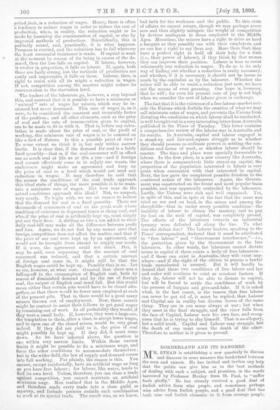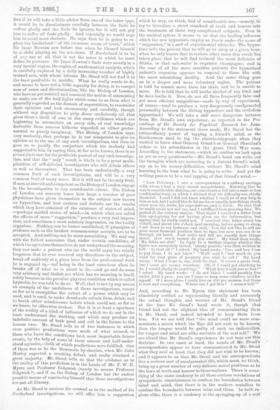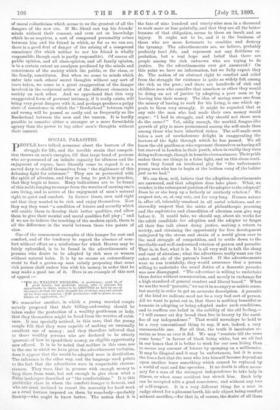BORDERLAND AND ITS DANGERS.
/[R. STEAD is establishing a new quarterly to discuss and discover in some measure the borderland between the seen and unseen. He has invited and invites any help that the public can give him as to the best methods of dealing with such a subject, and promises, in the words borrowed by Professor Huxley from St. Paul, to "suffer fools gladly." He has already received a good deal of foolish advice from wise people, and sometimes perhaps wise advice from foolish people, and a good deal that has both wise and foolish elements in it from average people. But if be will take a little advice from one of the latter type, it would be to discriminate carefully between the fools he suffers gladly and the fools he ignores, for it will not pay him to suffer all fools gladly. And especially we would urge him to avoid mere rhetoric. He says that he is going to ex- plore the borderland "of the immense ocean of truth," which Sir Isaac Newton saw before him when he likened himself to a child playing on the sea-shore. If Borderland is to be of any use at all, that is not the sense in which he must define its province. Sir Isaac Newton's finds were mostly in a very special region, the region of mathematical analysis, which is carefully explored by a daily increasing number of highly trained men, with whose labours Mr. Stead will not find it in the least profitable to meddle. What he really wants to do, and seems to have not a little capacity for doing, is to compel men of sense and discrimination, like the Bishop of London, who have as yet resisted and resented the notion of attempting to make use of the half-lights which come to us from what is generally regarded as the domain of superstition, to reconsider their opinions and look strenuously and carefully, though without any disposition to gulp down credulously all that gives them a thrill of awe, at the many evidences which are beginning to accumulate on every side, of real knowledge derivable from sources hitherto regarded as either preter- natural or purely imaginary. The Bishop of London says, very modestly, that perhaps he is not competent to give an opinion as to the use of any such investigations, and then he goes on to justify the conjecture which his modesty had suggested to him by saying that, so far as he knows, there is no prisul-facie ease for the profitable pursuit of any such investiga- tion, and that the "only" result is likely to be a great multi- plication of self-deluded investigators who will delude others as well as themselves. That has been, undoubtedly, a very common fruit of such investigations, and will be a very common fruit of many more. But it will not be the only fruit, if men as shrewd and competent as theBishop of London engage in the investigation to any considerable extent. The Bishop of London can scarcely know how large a number of pure physicians have given themselves to the subject now known as hypnotism, and how curious and definite are the results which they have obtained of the existence of states of mind, —perhaps morbid states of mind,—in which what are called the effects of mere "suggestion," produce a very real impres- sion, and sometimes a most salutary impression, on the bodily organism. Nothing can be better established, if principles of evidence such as the hardest common-sense accepts, are to be accepted. And nothing can be more astonishing. We may say with the fullest assurance that, under certain conditions, of which the operators themselves do not understand the meaning, they can make a patient who (as the world says) has totally forgotten that he ever received any directions on the subject, break off suddenly at a given hour from the professional work he is engaged in,—not being in the least conscious when, he breaks off of what he is about to do,—and go and do some very arbitrary and foolish act which has no meaning in itself, solely because in the peculiar physical condition which is called hypnotic, he was told to do so. Well, that is not by any means an example of the usefulness of these investigations, except so far as it exemplifies the extent of a power which may be used, and is used, to make drunkards refrain from drink, and to break other mischievous habits which could not, so far as we know, be otherwise broken. But it is at least a specimen of the reality of a kind of influence of which we do not in the least understand the working, and which may produce an indefinite amount of both good and evil in the future to the human race. Mr. Stead tells us of two instances in which even positive predictions were made of what seemed, to those who knew the conditions best, most improbable future events, by the help of some 'of these unseen and half-under- stood agencies,—both of which predictions were fulfilled. One of them was as to the Newcastle by-election, when Mr. John Morley expected a crushing defeat, and really obtained a great majority. Mr. Stead tells us that the evidence as to the reality of this prediction, is in the hands of Mr. F. W. H. Myers and Professor Sedgwick (surely he means Professor Sidgwick P), and if so, the Bishop of London has the easiest possible means of convincing himself that these investigations are not all illusory.
As Mr. Stead is anxious for counsel as to the method of his Borderland investigations, we will offer him a suggestion
which he may, we think, find of considerable use,—namely, to try to introduce a strict standard of truth and honour into the treatment of these very complicated subjects. Even in the medical sphere it seems to us that the healing influence
which the new hypnotists employ so freely under the name of "suggestion," is a sort of experimental white-lie. The hypno-
tises tells the patient that he will go to sleep at a given hour, when he only knows that in various other cases this result has taken place, that he will find train-oil the most delicious of drinks, or that salt-water is exquisite champagne ; and in the case of all the more sensitive patients the hypnotised patient's organism appears to respond to these fibs with the most astonishing docility. And the same thing goes on in a. deeper and more voluntary region. The patient is told he cannot move from his chair, and he is unable to move. He is told that he will loathe alcohol of any kind, and he does loathe it. Now, do not all these frequently false an4 yet most efficient suggestions—made by way of experiment, of course—tend to produce a very dangerously amalgamated personality between the fibbing hypnotises and the credulous hypnotised ? We will take a still more dangerous instance from Mr. Stead's own experience, as reported in the Pro- ceedings of the Society for Psychical _Research for June. According to the statement there made, Mr. Stead has the extraordinary power of tapping a friend's mind, as the Southerners used to tap the electric-telegraph when they
wanted to know what General Grant's or General Sheridan's orders to his subordinates in the great Civil War were. According to the statement,—which we confess we look upon as yet as very questionable,—Mr. Stead's hand can write out the thoughts which are occurring to a distant friend's mind, say as to his money-difficulties, without Mr. Stead's mind knowing in the least what he is going to write. And yet the writing proves to be a real tapping of that friend's mind 1—
." Last February, I met a correspondent in a railway carriage with whom I had a very casual acquaintance. Knowing that he was in considerable distress, our conversation fell into a more or loss confidential train, in which I divined that his difficulty was chiefly financial. I said I. did not know whether I could be of any help to him or not, but I asked him to let me know exactly how things stood, what were his debts, his expectations, and so forth. Ho said that ho really could not tell me, and I refVffined from pressing him. We parted at the railway station. That night I received a letter from him apologising for not having given me the information, but saying that he really could not. I received that letter about ten o'clock, and about two o'clock next morning, before going to sleep, I eat down in my bedroom and said, ' You did not like to tell me your exact financial position face to face, but now you can do so through my hand. Just write and tell me exactly how things stand. How much money do you owe P' My hand then wrote, My debts are £90.' In reply to a further inquiry whether thp figure was accurately stated, ninety pounds,' was then written in full. Is that all ?' I asked, My hand wrote, Yes; and how I am to pay them I do not know,' 'Well,' said 1, how much do you want for that piece of property you wish to sell ? ' My hand wrote, What I hope is, say, £100 for that. It seems a groat deal, but I must get money somehow. Oh, if I could get anything to do, I would gladly do anything ! " What does it cost you to live P ' I askod. My hand wrote : I do not think I could possibly live. under £200 a year ; you see I have to keep some relatives besides myself. If I were alone I could live on £.50 per annum, but there is rent and everything. Where can I get this ? I cannot tell.'"
And, according to Mr. Myers, this statement has been absolutely verified as representing literally and accurately the actual thoughts and worries of Mr. Stead's friend at the time Mr. Stead's hand wrote it, though that friend had not the slightest idea. of communicating them to Mr. Stead, and indeed intended to keep them from him. Yet we are told that "the mind could no more com- municate a secret which the Ego did not wish to be known; than the tongue would be guilty of sueli an indiscretion, for tongue and mind are alike servants of the real self." We are afraid that Mr. Stead's experiences do not bear out this doctrine. In two cases at least, the minds of Mr. Stead's correspondents appear to have communicated to Mr. Stead what they said at least that they did not wish to be known; and it appears to us that Mr. Stead and his correspondents live a curious sort of amalgamated life, which must, we think, bring up a great number of very delicate moral problems as to the laws of truth and honour in these matters. There is some- thing of the same tendency in all these curious revelations of sympathetic consciousness to confuse the boundaries between mind and mind, that there is in the modern socialism to confuse the boundaries between mine and thine. In both re- gions alike, there is a tendency to the springing-up of a sort
of moral colleetivism which seems to us the greatest of all the dangers of the new era. If Mr. Stead can tap his friends' minds without their consent, and even act on knowledge which he so acquires, a sort of compound personality arises between him and his friend in which, so far as we can see, there is a good deal of danger of the arising of a compound conscience (for which neither he nor his friend is wholly responsible, though each is partly responsible). Of course all public opinion, and all class-opinion, and all family opinion, is to a certain extent an amalgam produced by the minds and consciences of the society which the public, or the class, or the family, constitutes. But when we come to minds which enter into each others' secret thoughts without any sort of leave taken, we come to a great exaggeration of the danger involved in the reciprocal action of the different elements in society on each other. And we apprehend that this very exaggerated form of personal intimacy, if it really exists, will bring very great dangers with it, and perhaps produce a pulpy state of conscience in which the " Borderland " between right and wrong will be passed as easily and as frequently as the Borderland between the seen and the unseen. It is hardly possible to conceive either a stranger or a more formidable agency than the power to tap other men's thoughts without their consent.




































 Previous page
Previous page